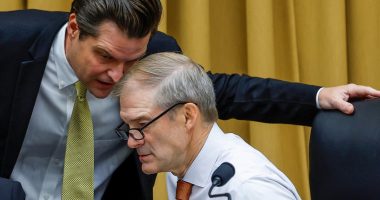LONDON—Consumer prices in the U.K. rose at the fastest annual rate in nearly three decades last month, strengthening the case for further increases in the Bank of England’s key interest rate as the country’s economy emerges from the Omicron wave.
Economists expect growth took a hit in December as households hunkered down in response to the new coronavirus variant. But cases are now falling rapidly from a peak earlier this month, and growth is forecast to bounce back quickly as the government prepares to lift additional restrictions aimed at curbing the highly transmissible strain.

The U.K. is bracing for inflation to peak at about 6% in April.
Photo: Hollie Adams/Bloomberg News
The latest inflation data, however, will amplify concerns about a cost-of-living squeeze that is likely to weigh on consumer spending, and increases the odds of the BOE raising interest rates again at its next meeting in February.
Consumer prices in the U.K. rose 5.4% in December compared with a year earlier, the Office for National Statistics said Wednesday—the biggest annual jump since March 1992. Economists polled by The Wall Street Journal had expected prices to rise by an annual 5.2%, following a 5.1% increase in November.
The pickup in inflation was driven by higher prices across a range of items including food and certain goods that have become harder to obtain because of pandemic-related supply-chain disruptions. Services inflation also continued to pick up, driven by higher transportation and storage prices, to reach 3.4% in December.
The U.K. is bracing for inflation to peak at about 6% in April, when a cap on energy prices imposed by British regulators is due to be revised. That is more than three times the BOE’s target of 2%. A planned tax increase the same month is set to erode disposable incomes further.
After that, economists are expecting inflation to fall back as the global economy recovers and supply-chain kinks work themselves out.
The Omicron variant has complicated the calculus for other central banks weighing moves to curb inflation against the risk of throwing the economic recovery off course.
The Federal Reserve is expected to begin raising rates soon, after prices in the U.S. rose by 7% in December—their fastest pace in nearly four decades—due to supply-and-demand imbalances, along with stimulus intended to shore up the economy.
In the U.K., data earlier this week showed the economy grew by a stronger-than-expected 0.9% in November, taking it past its pre-pandemic peak before Omicron took hold. Unemployment also inched down again despite the winding down of a job-support program in September.
“Today’s numbers coupled with strong labour market data suggest that a bank rate rise on 3 February is virtually nailed on,” said Philip Shaw, chief economist at Investec Securities, predicting an increase of 0.25 percentage point.
SHARE YOUR THOUGHTS
What is your outlook on the British economy for the next quarter? Join the conversation below.
That would lift the policy rate to 0.5% from a record low of 0.1% before the BOE raised it to 0.25% in December, saying the strength of the labor market justified higher borrowing costs to keep a lid on price growth.
Members of the BOE’s Monetary Policy Committee will be looking for signs of wage growth that could feed into prices and result in an inflationary spiral like that seen in the 1970s. As in other developed economies, the size of the U.K. workforce shrank during the pandemic, resulting in labor shortages that could give workers the power to bargain for pay increases.
James Smith, developed markets economist at ING, also expected the BOE to raise rates next month, but said it would tighten more slowly beyond that. “With inflation rates set to plunge in 2023, and the prospects of a severe wage-price spiral looking less likely, subsequent moves are likely to be more gradual,” he wrote.
Write to Isabel Coles at [email protected]
Copyright ©2022 Dow Jones & Company, Inc. All Rights Reserved. 87990cbe856818d5eddac44c7b1cdeb8









